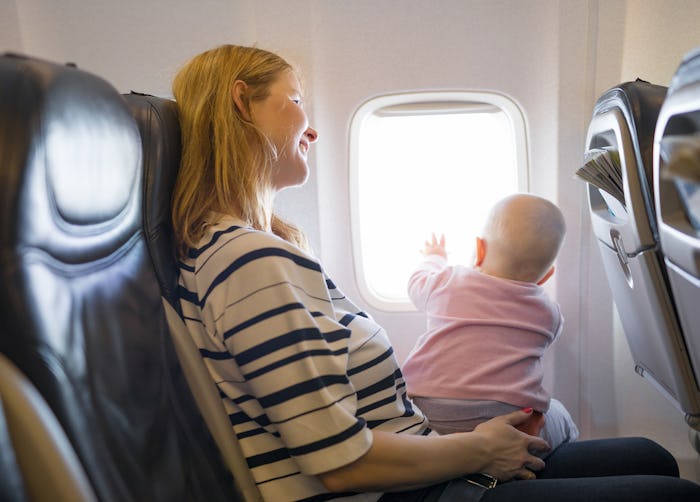Life
5 Baby Jet Lag Hacks That Work, According To Science
If the thought of traveling to a new time zone with a baby in tow sounds like hell, you're probably right. Switching up much-fought-for sleep routines for the sake of a vacation that may end up being way more hectic than life at home doesn't sound that appealing. But with these baby jet lag hacks, you and your family should be able to sync up to a totally different timezone in a matter of days.
You can conquer baby jet lag by keeping your little one hydrated, fed on a strict schedule, and starting to adjust her sleep schedule before you even hit the airport. "Traveling across time zones disrupts your sleeping, waking, and eating cycles. Any trip you take with more than a two-hour time change forces your body to adjust to a new schedule," explained Baby Center. However, one of the fastest ways to get adjusted to a new time zone, whether you're a baby or an adult, is to jump to the new time zone's routine as soon as you can. That means if you take a red-eye flight and miss a night's sleep, the first day could be pretty miserable. However, if you can manage to rally on that first day and stick to a strict schedule for your baby, you can *fingers-crossed* salvage the rest of your vacation. Everyone will adjust more quickly to the new time zone after that first day, than if you give in and let your baby take a five-hour nap in the middle of the day.
Here are a few more tips for getting your little one over their jet lag ASAP.
1Hydrate
Jet lag, according to Medicinenet.com, messes with your circadian rhythm and can cause "fatigue, insomnia, and other symptoms as a result of air travel across time zones." Womp womp. One other such symptom is dehydration, which can make your baby feel much worse during long travel and for days afterward.
The Child Development Institute suggested stocking up on fluids for your little one. "Flying in an airplane can cause dehydration, which occurs much more quickly in a child than with an adult," the site explained. "Keep your baby well hydrated with water, juice, or milk." If your baby is too young for juice or water, make sure you pack enough bottles to last, especially if there is an unexpected flight delay.
2Get Lots of Light
New York Times science journalist Max Lugavare explained to AirHelp that getting sunlight in your new time zone is important to reset your body clock. The same goes for babies who definitely do experience jet lag. Lugavare explained, "Our bodies and brains have literally evolved to sync with the sun," and suggested getting into the sunlight as soon as you arrive at your destination, and then first thing the next morning to "anchor the body's entire 24-hour cycle."
3Make It Dark
In order to help your baby get over jet lag more quickly, starting your flight by jumping onto the destination time zone is key. However, if your flight doesn't dim the cabin lights, it can be tricky to get a little one to sleep with all that stimulation. Health explained that darkness is critical to being able to fall asleep at night: "Light inhibits the secretion of melatonin, a hormone that naturally promotes sleep." What's a parent to do on a flight that keeps the lights on? Netmums suggested, "Draping a few spare blankets over a seat can be a helpful way to create a dark den," and that will hopefully encourage your little one to sleep ASAP. But make sure your baby is not fully covered, you can keep an eye on your baby the entire time, and that there is ample air flow.
4Start With Breakfast
In addition to getting on your destination's time zone ASAP, get on their mealtime schedule as soon as you can too. Even if your baby didn't sleep a wink on the red-eye flight, feed her her normal breakfast as soon as you land and get settled, according to Slate. "Unless you have gone east with kids you want to hang out with until late night, switch everything over to the new time once you arrive—mealtimes, naptimes, bedtimes," the site explained.
To help even further, you can try implementing the Argonne anti-jet-lag diet to help with the task of switching over. The Argonne diet was developed by Dr. Charles F. Ehret of Argonne's Division of Biological and Medical Research and advises eating proteins for breakfast in order to encourage wakefulness and carbohydrates for dinner in order to stimulate sleepiness, according to The New York Times.
5Get Moving
Physical activity during light hours can help your baby power through until their new bedtime in the new time zone. The Journal of Physiology reported, "The circadian system co-ordinates the temporal patterning of [behavior] and many underlying biological processes. In some cases, the regulated outputs of the circadian system, such as activity, may be able to feed back to alter core clock processes." In other words, moving and grooving during the day can help reorganize your baby's circadian rhythms and get you onto the new time zone more quickly.
